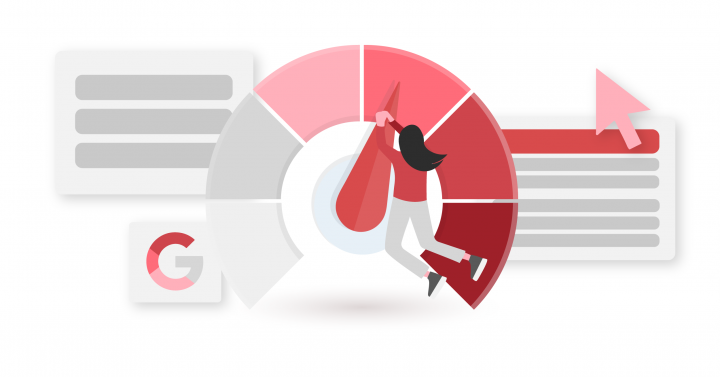
Keyword difficulty can be a tricky metric to use. On the one hand, it provides a simple model that anyone can understand to help predict whether or not you'll be able to rank for a keyword.
On the other hand, however, it isn't used by Google, and the formula cannot consider all ranking factors. It's rarely ever 100% accurate, and so relying entirely on it might mean you miss great opportunities.
My general point in this post is that keyword difficulty is useful, but not bulletproof. And there isn't a single tool which is reliably the best every time. For your best shot of predicting real keyword difficulty, you should combine the third party metric with learning to manually analyze a SERP.
We'll cover:
- An explanation of how keyword difficulty is calculated
- The limitations of keyword difficulty formulas
- How to spot when keyword difficulty is actually easier than it seems
- 5 recommend software tools to use (TL;DR: Semrush is probably best)
Understanding keyword difficulty
Before you start using software to analyze keyword difficulty, it's important that you understand how it works.
Let's take 2 minutes to clarify what it is, how it's calculated, and the limitations of it.
Keyword difficulty is a 3rd party metric that gives every keyword a score from 0 to 100. The lower the score, the easier it should be to get onto page one (not rank #1).
How keyword difficulty is calculated
This metric is developed by third party software providers (not Google), and as such, the exact formula varies in different tools.
Historically there's been quite a lot of different ways companies have tried to calculate keyword difficulty. Certainly in the last few years though, the most widely used is simply an indication of backlink profile strength.
The metric takes into account how many backlinks each of the current page one results have, and correlates a weighted average with a logarithmic scale to estimate how many backlinks are needed.
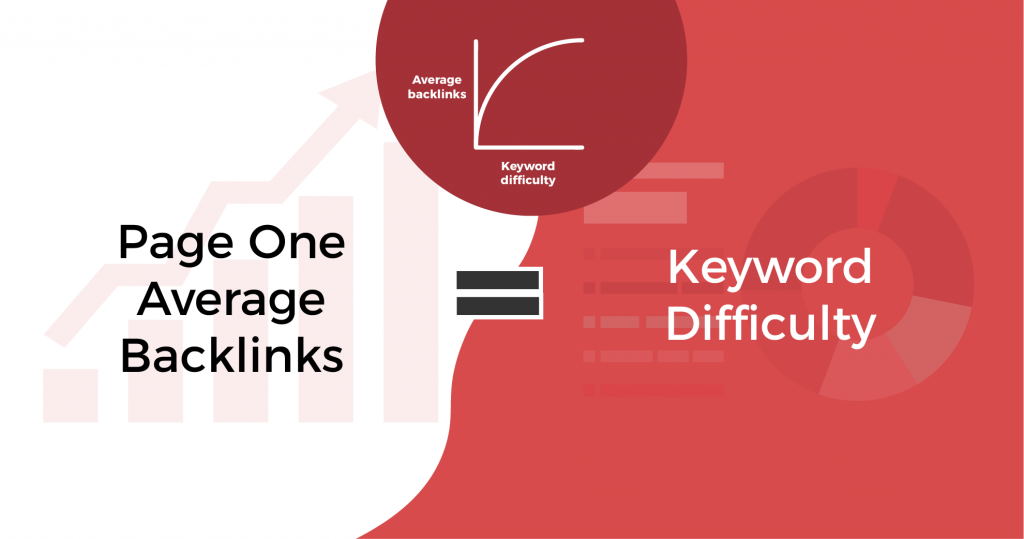
This calculation fails to take into account many other ranking factors, and as such some companies are starting to adjust their formulas in an attempt to tackle that issue.
Let's first take a look at the limitations of this method to calculate keyword difficulty.
Limitations of keyword difficulty software
Basing keyword difficulty entirely on backlink strength is flawed.
It's common to see a low authority domain with no backlinks ranking in the top 3 positions. Why? Because there are other heavily weighted ranking factors involved:
- Relevance
- Content quality
- Topical authority
- Link quality
- Internal backlinks
- E-A-T
- User experience
These are difficult (perhaps impossible) to ever simplify into a single numeric score.
Still, despite the flaws of keyword difficulty calculations, the metric is useful. Especially for beginners.
And software providers are starting to develop more advanced formulas. Semrush in particular have invested in this. Their new calculation still heavily weights backlinks, but also considers domain rating, search volumes, and some other factors. More on this later.
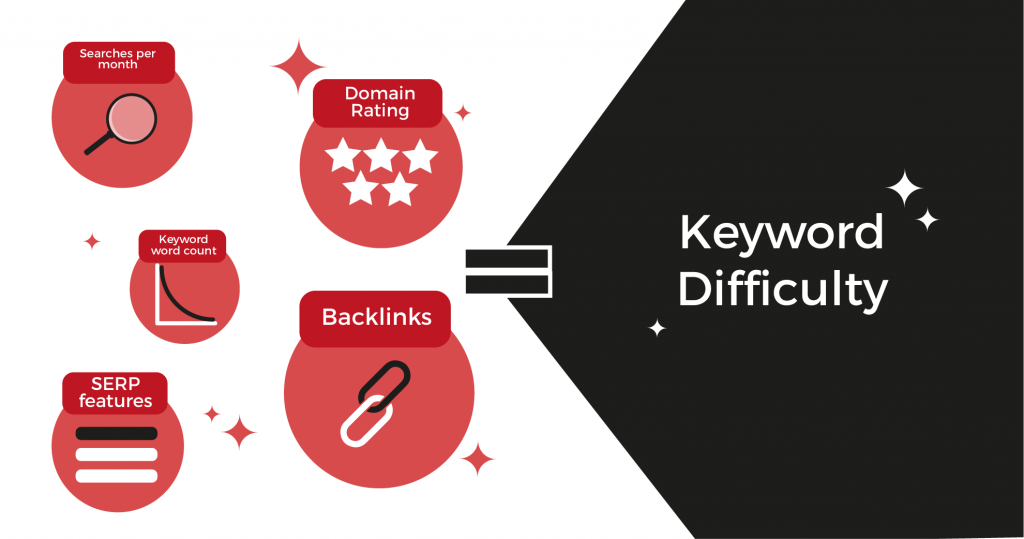
This is a step in the right direction, but it's still nowhere near bulletproof.
Manual analysis is best
If you want the absolute best shot at predicting how easy or hard a keyword will be to rank for, combining the KD metric with a manual SERP analysis is the way to go.
If you can learn to spot when the given keyword difficulty score is inaccurate, you uncover great opportunities that competitors have missed.
Even in competitive niches, you're still likely to find keywords that are much lower competition than their KD would lead you to believe. Here's a couple of quick examples before we move on to software recommendations.
Keyword difficulty is sometimes easier than it seems
The biggest thing to look out for in my experience is relevance. If the current top results don't perfectly satisfy the search query, you can outrank them without backlinks. Such a SERP might look something like this:
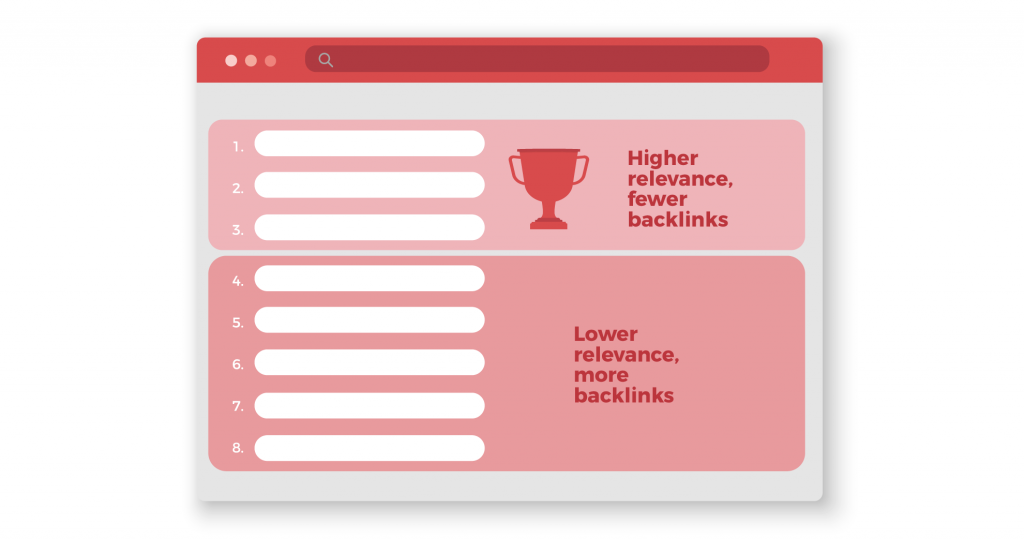
Keyword difficulty spikes up high because of generic content with a high number of backlinks. But if you dig in, you'll see that the more relevant content, despite lower DR & backlinks, ranks higher.
Here's a real world example to illustrate.
This is the SERP for ‘newsletter introduction examples'. Notice how the top 4 results are all specifically about newsletter introduction examples. Below that, we start getting articles that are generally about newsletter examples.

You see a clear opportunity here: every article about introduction examples outranks every article about general newsletter examples.
Further down the page, we have strong, high traffic articles with hundreds of backlinks from the likes of HubSpot & Sendinblue. Since they're present on page one, their backlinks cause the keyword difficulty score to increase:

We (Skale) worked with Flodesk (who now rank #1 for the keyword) on this, so I can share first-hand how quickly it worked.
Sure enough, we near-instantly skipped past all the generic articles to 4th place, then ranked #1 within one month (for ‘newsletter introduction examples', as well as ‘newsletter introduction' and other longtails).

In my SEO quick wins article I gave another example that fits the same theme of superior relevance. In this SERP (keyword = ‘product demand analysis'), there's only one article specifically about product demand analysis.
All of the more generic content on demand analysis, including the DR91 article with 457 backlinks, was outranked within weeks due to superior relevance.

There are many other examples of this, but you get the point. I'm sure you can find keywords in your niche that present a similar opportunity. Probably not crazy high value commercial keywords, but certainly keywords that attract the right ICP.
Tip: When you find a SERP that is genuinely underserved by current content, you'll also find that a content optimization tool like SurferSEO, Clearscope and their alternatives could lead you astray. Their recommendations are based on what currently ranks. That's no good if the content is no good!
5 best keyword difficulty software tools
I want to start here with the caveat that I haven't done a large-scale study on the accuracy of KD metrics per tool.
(If anyone is aware of such a study, I'd really like to see it. Let me know!)
The second caveat is to reiterate that I find some keyword difficulty scores are wildly inaccurate (due to the reasons explained above), even including Semrush who now have the more ‘advanced' formula.
These 5 tools are listed due to my personal experience in keyword research, experiences I've heard from others in the SEO community, and opinions on data sources/quality. To my knowledge, even considering all the limitations I've mentioned, they're the best options for the majority of us.
These are the tools listed. Feel free to keep scrolling for more detail on each.
- Semrush: an all-in-one SEO (& marketing) platform
- Ahrefs: an all-in-one SEO platform
- Content Harmony: a tool for creating SEO content briefs quickly
- Mangools: a cheaper alternative to Ahrefs or Semrush with fewer features
- LowFruits.io: a keyword research tool for finding low-competition queries
1. Semrush
Starting price: $99 per month (annually) or $119 per month (monthly)
Free trial: Yes. 7 days. Sign up here.
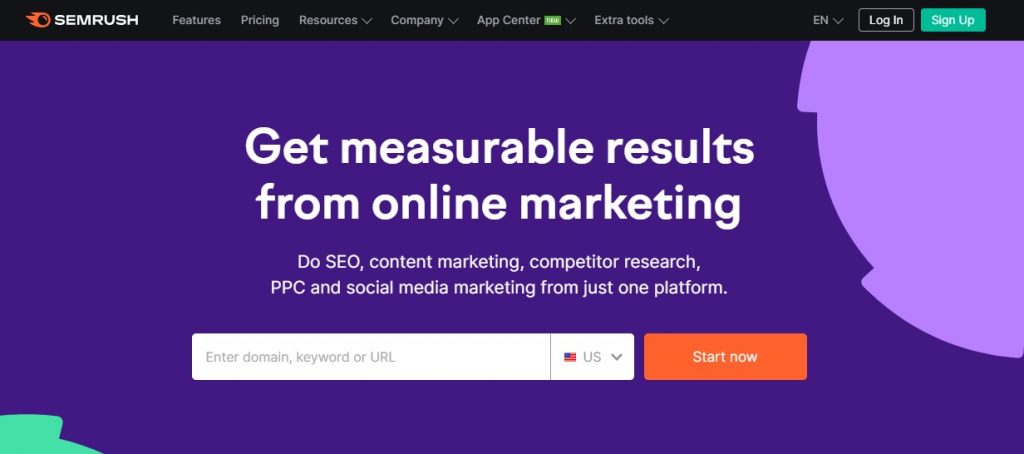
Semrush is an all-in-one tool that includes features for most things that you can think of in SEO (and a growing number for other marketing channels too).
I'm not going to explain the full functionality of Semrush, but they cover the full suite of tools you'd expect in an ‘all-in-one' SEO platform:
- Rank tracking & reporting
- Competitor analysis
- Technical site auditing
- Backlink monitoring
- And of course, keyword research
(plus a lot more)
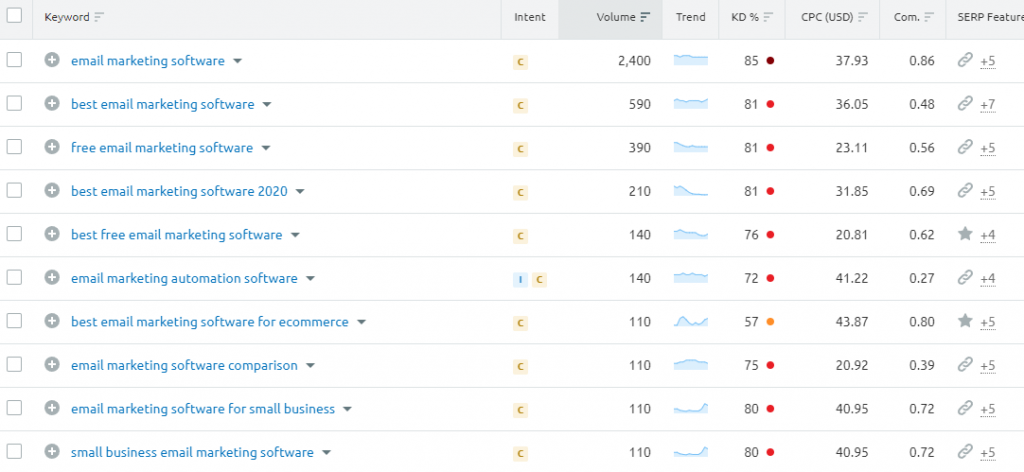
As mentioned they're also investing heavily into their keyword difficulty formula.
Semrush expresses keyword difficulty in terms of a percentage:

And, since mid-2021, they've advanced their formula to consider many new factors.

I'd encourage you to read their blog announcement yourself. In a nutshell though, you can see that it still heavily weights referring domains, but now takes into account a lot more.
As I mentioned, it's still not perfect. There are still exceptions, and I don't expect that any tool will be able to get this perfect anytime soon.
2. Ahrefs
Starting price: $82 per month (annual) or $99 per month (monthly)
Free trial: No. 7 day trial for $7. Sign up here.
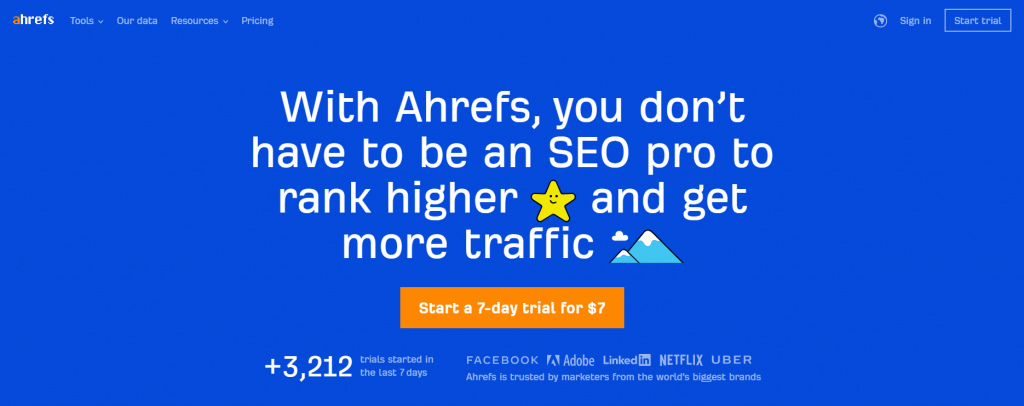
Ahrefs is a great, very popular all-in-one SEO platform which I personally use. Like Semrush, it covers all the SEO functions you would expect: keyword research, rank tracking, competitor analysis, technical site auditing. There are some unique features which you can read about here.
Ahrefs' keyword difficulty is one that is entirely based on backlinks, which, as I've mentioned, has limitations.

There are scenarios, like this example below, that are far out. You obviously aren't going to rank for ‘audi rs6' in Germany with 2 backlinks:

See more examples in this Semrush article (though obviously, bear in mind it's biased).
In my experience, Ahrefs gets more & more accurate for higher volume keywords in the US & UK. So if you're not working in other countries on low-volume keywords, you'll likely do very well with using Ahrefs as a keyword difficulty tool.
And in the interests of fairness, there are plenty of situations where Ahrefs KD was more accurate than Semrush.
Following the example of ‘newsletter introduction' from earlier:

Compared to:

In reality, I think both tools overestimated difficulty, but Ahrefs was closer. The takeaway point here is that neither software tool is the ‘best' 100% of the time.
Ahrefs toolkit overall is good enough that they're still worth checking out if keyword research & competitor analysis is high up on your priority list. Just make sure you can spot the outliers. SERPs where the KD score is likely to be wrong.
3. Content Harmony
Starting price: $99 per month (monthly) or $89 per month (annually)
Free trial: No, but you can try 10 content briefs for $10. Sign up here.

Content Harmony is a tool for building SEO content briefs quickly. They offer (what I believe to be) a unique approach to keyword difficulty.
By splitting keyword difficulty into three separate metrics, it's easier to understand why exactly a keyword is easy or hard to rank for:
- Content difficulty
- Link difficulty
- Domain difficulty

Knowing these individual scores help you to understand whether you'll be able to compete from your unique position.
- Is the content poorly optimized?
- Does the page have a low volume and/or quality of backlinks?
- Is it published on a high DR domain?
If you find a keyword with a high domain difficulty and high link difficulty, you may still compete by writing better optimized content. If you find high content & domain difficulty, but low link difficulty, you may compete by building high quality backlinks. And so on.
If creating content briefs for a writing team is a top priority for you, I'd recommend checking out Content Harmony. It will not replace an all-in-one SEO platform, but it's a great addition that can save time on your content SEO processes, especially at scale.
4. Mangools
Starting price: ~$35 per month (annual) or ~$60 per month (monthly)
Free trial: Yes. 10 days. Sign up here.

If your budget doesn't stretch far enough for something like Semrush or Ahrefs, Mangools is a good bet for you.
They're an all-in-one tool (not quite as comprehensive, which is reflected in the lower price), and their #1 killer feature is definitely KWFinder, a keyword research tool.
They also cover competitor analysis, backlink monitoring, rank tracking and reporting. Those features are fine; they'll do the job just fine (e.g. daily rank tracking), but there's nothing super special about them.
KWFinder though is really great, despite how cheap the platform is. The volumes are pretty accurate (especially on low-volume longtail keywords), and the trends data is nice too:

They also report on keyword difficulty of course. Their KD formula is based on backlinks, and also considers Majestic metrics (citation flow & trust flow). Naturally it's not perfect, but still, as far as the market average goes, the accuracy is not bad.
Like with the previous tools, if you know the basics of how KD works to spot the outliers, you'll do well with it.

5. LowFruits
Starting price: $25 for 2,000 credits ($0.0125 per keyword)
Free trial: Yes. 250 credits. Sign up here.
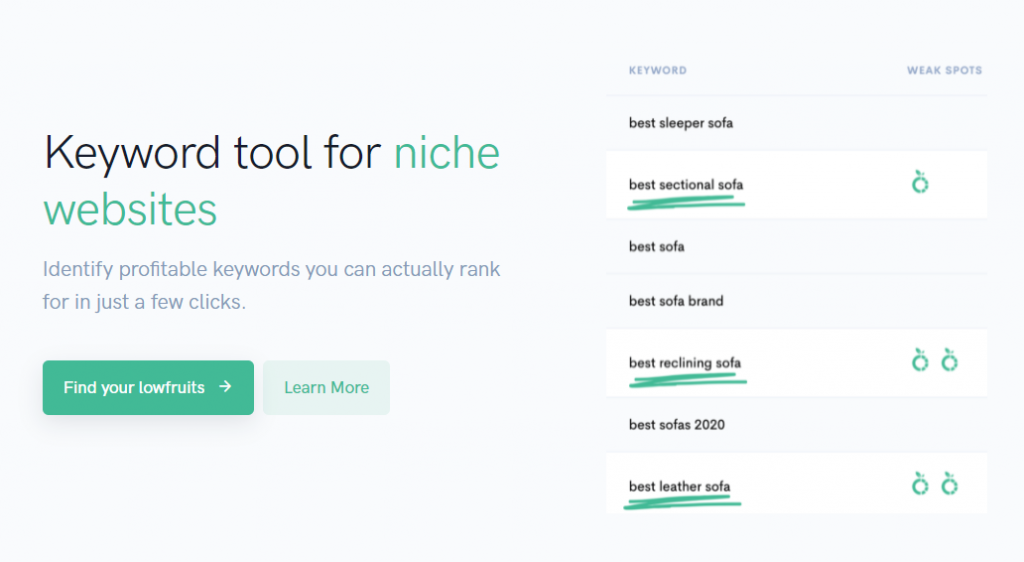
LowFruits is a bit of a curveball for this post, because it doesn't actually offer a keyword difficulty metric.
Or rather, it takes a slightly different approach to keyword difficulty.
The tool is built specifically to find ‘low hanging fruits'. Keywords that will be easy to rank for, even on lower authority domains.
How? By identifying ‘weak spots' in the the SERP.
If you have a list of keywords (LowFruits can help you with that too), there's a one-click filter to show only terms that have these weak posts in the SERP.
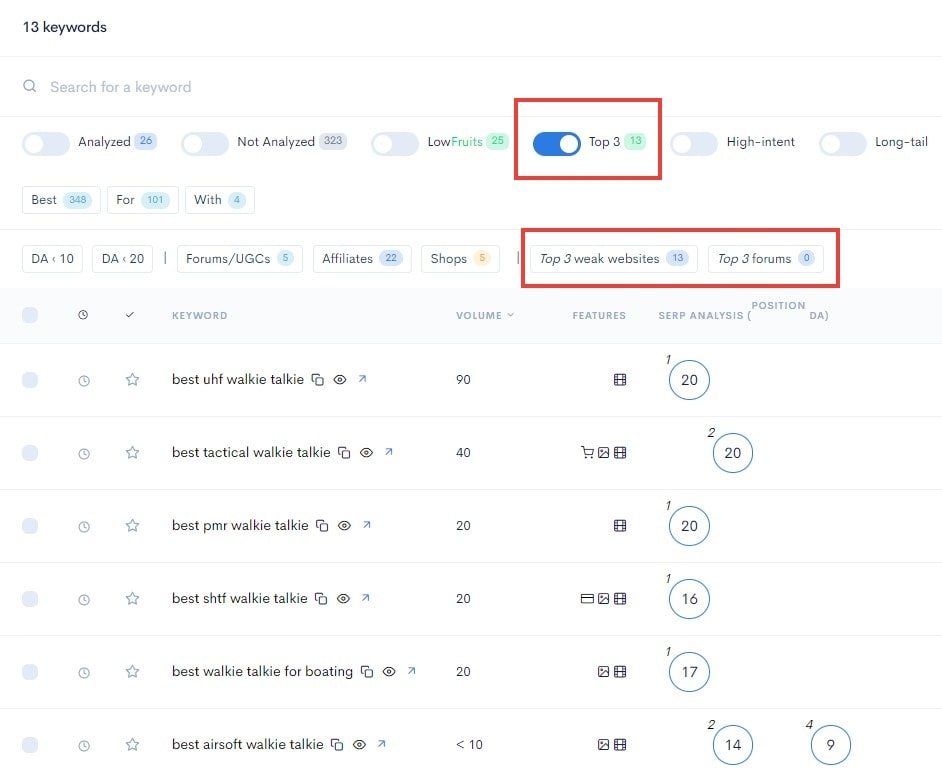
A weak spot here would be defined by either:
- Having a forum in the top 3, or a Reddit/Quora thread, or
- A site with a maximum DA/DR (e.g. up to 20)
Both of these would indicate a low competition keyword. Those filters can help you cut down a list of thousands of keywords in minutes.
LowFruits works on a credit-based system, rather than a monthly subscription. Handy for something like quarterly or ad-hoc content planning without the cost every month.
Use keyword difficulty software, but learn to manually review a SERP too
Keyword difficulty is a useful metric, but it has limitations. You should learn to manually analyze a SERP too, and spot when it's not accurate.
Software providers are starting to adapt their formulas to make for more accurate ratings.
Semrush currently have the most advanced formula for rating keyword difficulty, which is great, but it's still not best 100% of the time. Ahrefs is worth a look too for a great all-in-one SEO platform that offers keyword difficulty.
If you're looking for an all-in-one platform that includes keyword research & difficulty on a smaller budget, Mangools is likely to be your best bet.
Content Harmony & LowFruits both offer alternative approaches, helping you with more specific use cases.
Good luck!
